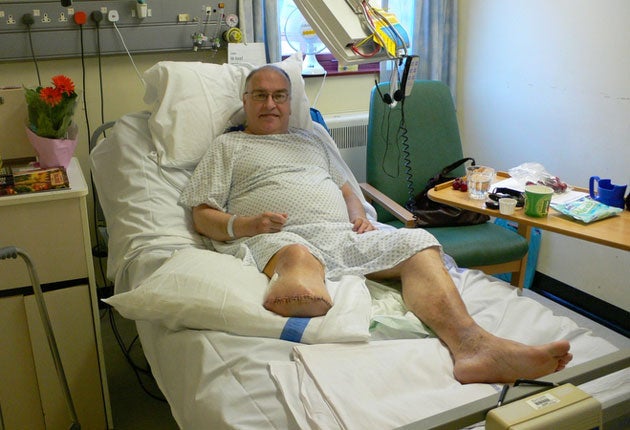Thousands of needless amputations and deaths 'could be prevented'
Diabetics and those with circulation problems are unnecessarily losing limbs and being exposed to further health risks

Your support helps us to tell the story
From reproductive rights to climate change to Big Tech, The Independent is on the ground when the story is developing. Whether it's investigating the financials of Elon Musk's pro-Trump PAC or producing our latest documentary, 'The A Word', which shines a light on the American women fighting for reproductive rights, we know how important it is to parse out the facts from the messaging.
At such a critical moment in US history, we need reporters on the ground. Your donation allows us to keep sending journalists to speak to both sides of the story.
The Independent is trusted by Americans across the entire political spectrum. And unlike many other quality news outlets, we choose not to lock Americans out of our reporting and analysis with paywalls. We believe quality journalism should be available to everyone, paid for by those who can afford it.
Your support makes all the difference.Thousands of people are needlessly having legs, feet and toes amputated because of a failure to treat foot diseases properly. More than 11,000 people in England suffered amputation of a lower limb because of disease last year – a 7 per cent rise since 2004/05. Half of these amputees die within two years because of circulation problems that lead to heart attacks or stroke. At least half of amputations caused by diabetes and peripheral arterial disease (PAD) could be avoided if patients were seen by foot specialists more quickly, according to research.
Yet a new audit presented at a conference last week found that one in three diabetics in hospital did not have their feet examined despite the fact that 100 diabetics have lower limbs amputated every week. There are three million diabetics in the UK and they are 24 times more likely than the general population to suffer an amputation.
Lower limb amputations cost the NHS between £50m and £75m every year while properly treating the preceding diseases costs just a fraction of this amount. In a Commons debate last week about the scandal of Britain's amputees, the Labour MP Brian Iddon said: "We could save legs and save money, even in an age of austerity."
The country's leading vascular surgeons meet tomorrow for the Saving Legs conference to discuss how to reduce Britain's shameful amputation rate, among the highest in Europe.
Dr Gerry Rayman, a diabetes expert from Ipswich, said: "This is not rocket science, so why are we not doing it? It is a scandal that we have been talking about better organised services for more than 10 years, but nothing much has changed. If this continues then we will see more and more amputations in younger people because the rates of obesity and diabetes are on the rise."
PAD is caused by narrowing of the arteries, usually in the legs. This leads to poor blood flow, causing pain and cramps in the calf, thigh or buttocks. Without proper blood flow, wounds cannot heal, causing infection, ulcers, gangrene and, if left untreated, amputation. PAD affects 30 per cent of over-55s; diabetes and smoking are major risk factors. PAD and diabetes together are a dangerous combination.
Roger Lewis, 60, a former teacher from Watford, was diagnosed with type 2 diabetes in 2000. He did not change his diet or stop smoking, and went on to develop peripheral arterial disease in his right leg in 2004. By the time he was referred to a vascular surgeon two years later, it was too late. His leg was amputated below the knee.
In a handful of areas such as Ipswich and Middlesbrough, small, cheap but well-organised NHS teams of foot specialists reduced leg amputations by at least 50 per cent within three years.
These teams include a podiatrist, dietician and medical experts in diabetes, blood vessels and orthopaedics. In other areas, most patients are referred to a vascular surgeon when it is too late to save the limb, says the Circulation Foundation.
Louise Stewart, a specialist podiatrist in Manchester's foot clinic, said: "Podiatrists everywhere are firefighting because services are so patchy. It is shocking that more than 100 limbs, in patients as young as 35, are lost every week. It is a devastating loss which could often be avoided."
The Government says its new health-check programme for 40- to 75-year-olds launched last year will improve detection of PAD and diabetes.
Join our commenting forum
Join thought-provoking conversations, follow other Independent readers and see their replies
Comments